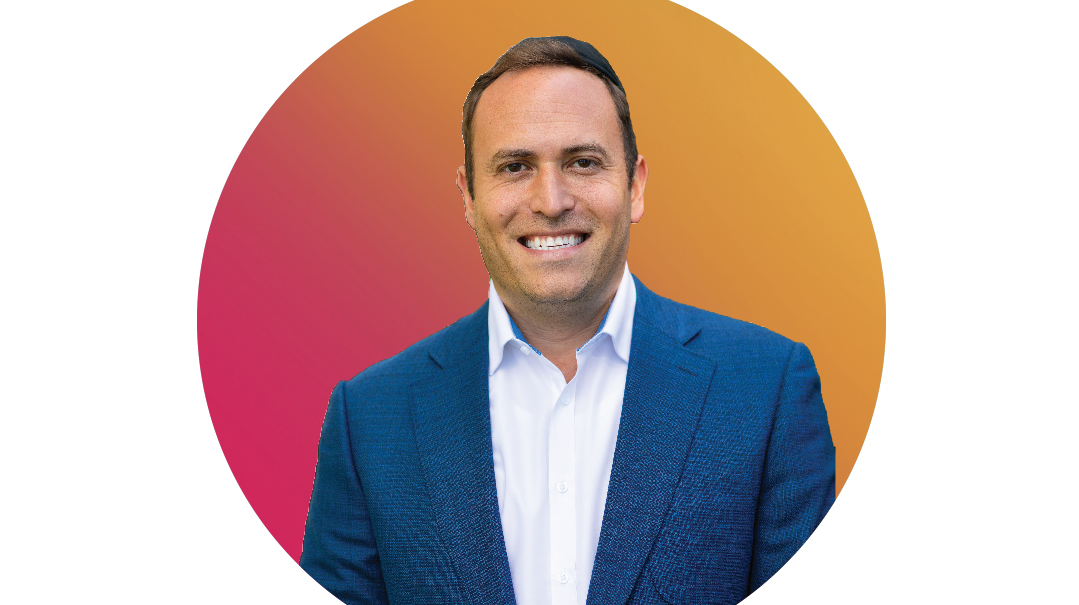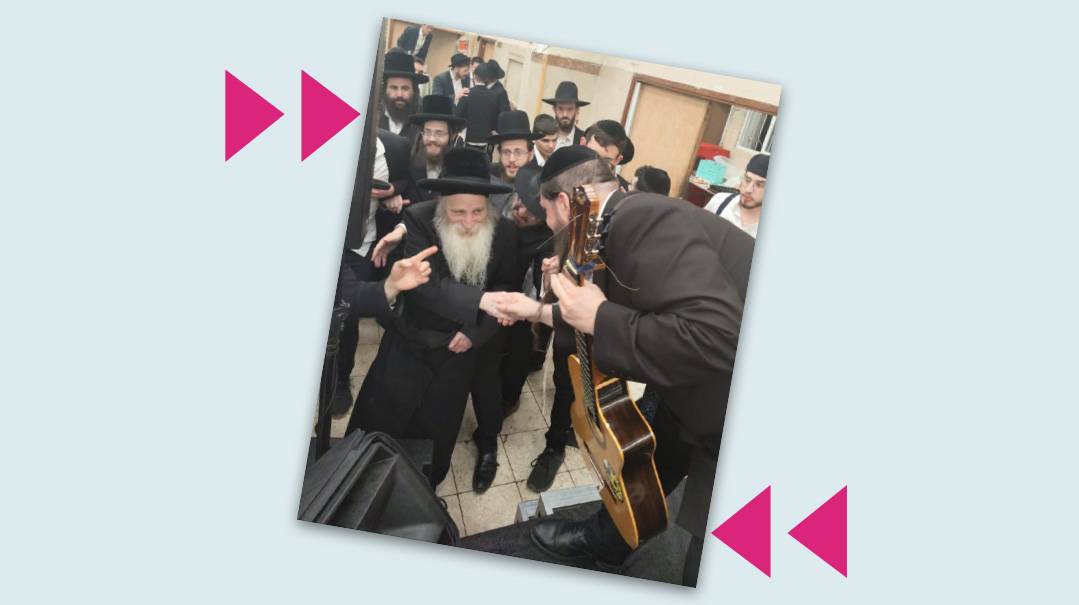Mood Mix with Rabbi Fully (Raphael) Eisenberger
| April 21, 2021With studio experience as a bochur and his still-robust voice, Rabbi Fully keeps the music going

When it comes to campus kiruv, RABBI FULLY (RAPHAEL) EISENBERGER has figured out how to bring the sounds of Yiddishkeit into the hearts and minds of the most distant students. As the dynamic director of the Olami-affiliate Jewish Resource Center, a happening kiruv program at the University of Michigan in Ann Arbor, Rabbi Fully, his wife Shani, and their children host myriad students for what’s often their first taste of Shabbos and have been pivotal in changing around the lives of dozens of them, many of whom go on to marry and live their lives as shomrei Torah and mitzvos. With studio experience as a bochur and his still-robust voice, Rabbi Fully keeps the music going.
MY ALL-TIME FAVORITE JEWISH ALBUM
I’m a huge Dedi fan, you could say I’m totally Hooked on Dedi! When I was growing up, his V’ohavto CD was my alarm clock. Besides that, an amazing album I always love hearing is Avi Fishoff’s Solid Gold III. The Solid Gold series had all the big singers on it, and the third volume has some memorable songs, especially the title track “Hearts of Gold,” with the chorus, “Here we stand, on solid ground, with hearts of gold...”
SONGS THAT WORK FOR A KUMZITZ EVEN WITHOUT MUSIC
Classic kiruv songs — like Yo Aisenstark’s incredible “Tov Lehodos” — are fine without music, and then there are also certain Carlebach niggunim, like “Niggun Neshamah” and what’s known as the “Belz Niggun.”
MY FIRST RECORDING EXPERIENCE
In early 2000s, I sang in the choir on the Oneg album that Ben Klein released, then on Yo Aisenstark’s Shearim and Dani Kunstler’s Vehavi’einu.
WHAT I MISS MOST ABOUT MUSIC DURING SEFIRAH
I sometimes run my Israel trip for college kids during Sefirah. When the kids are listening to their non-Jewish music on the coaches, and I don’t have any other alternatives to listen to, it can be very challenging.
HOW MUSIC IMPACTS OUR TRIPS
My kiruv program takes college students for the experience of a lifetime in Poland. Our visits to the Lodz ghetto, the ancient shuls, and even the Valleys of Death are always accompanied by inspirational song. We also do a three-week Israel trip, and I make sure to play Jewish music, taking the opportunity to expose my students to something new and very different from the garbage they listen to. I remember one Friday playing MBD’s famous “Yismechu” on the bus heading to our hotel and offering a reward to anyone who could tell me how many times the song repeats the word “Shabbos.” It’s not really countable, but that got the word Shabbos buzzing through everyone’s minds.
HOW I CONNECT WITH UNLETTERED JEWS THROUGH SONG
My song of choice is the beautiful “Yehi Ratzon” (Bircas Habanim), originally sung by Ohad Moskowitz. I sing it with my children on Friday nights, and I explain it to our guests. It might seem distant from the lives the college students lead, but it actually resonates with a deep inner yearning they all have, and it blows them away.
MY EARLY START
As a boy, I was blessed with a nice voice, but my mother only wanted me to use it for davening. When I was 13, I began to daven for the amud at BAYT in Toronto, which is a really large shul. I was taught by the amazing chazzan Kalman Weber. That was a major opportunity to develop my davening skills.
AN INSTRUMENT I WISH I PLAYED
Since I was a kid, I’ve longed for drums.
A SONG THAT BLOWS ME AWAY EMOTIONALLY
“Yizkereim,” especially as MBD sang it at HASC, interjected by scenes of the Sbarro bombing. That always moves and shakes me.
A SONG I HOPE MY KIDS WILL BE ABLE TO APPRECIATE
The Carlebach “Mimkomcha.” You can sense the majesty and the pleading in those words when it hits the high notes. But I’m not at all sure that the next generation will go for it.
A SONG I NEVER GET BORED OF
“Lo Yisa Goy” and other songs performed by Miami Boys Choir in the 1990s, when I was growing up. Remember that drum solo at the beginning?
WORDS THAT GET ME EVERY TIME
“Im eshkacheich Yerushalayim...” It’s really special when I have the privilege of singing it under the chuppah at a student’s wedding.
WHY I SING EVEN THOUGH MY GUESTS ARE CLUELESS
I think many kiruv homes skip the longer, traditional zemiros because the words are complicated and seem difficult for newcomers to connect to, but I’ll never skip the traditional, slow, “Kol Mekadesh Shevi’i.” I grew up with it and it is part of Shabbos in my home. The kids sing along and harmonize, and even though most of our guests can’t follow it in the bentsher, or even the transliteration, they enjoy listening to a family favorite.
A MUSIC ARTIST I CAN REALLY CONNECT WITH
Yaakov Shwekey. I love hearing him sing Sephardic niggunim, but he is so versatile that the Ashkenazic-style songs come out outstanding too.
THE HIT DANCE SONG WHEN I GOT MARRIED
Yossi Green’s “Dido Bei” was a huge hora song back then.
WHAT A SONG CAN DO
We recently had a student here, Dylan, who was greatly impressed by Yiddishkeit and became interested in going to yeshivah in Eretz Yisrael.
During the COVID lockdown last spring, he was at home with his parents and mentioned his plans to them. They were pretty upset and gave him a hard time. When Dylan called me, I tried to calm him down. Then, after he hung up, I had a thought. I knew that he loved the song “Vezakeini,” because he’d request that we sing it every single week. I called Baruch Levine, a fellow Torontonian and yeshivah friend, and asked him to reach out to Dylan and sing the song to him. Baruch immediately did it, and sang the entire piece beautifully over the phone, to an audience of one. Dylan was blown away. He got a tremendous amount of chizuk from the gesture of care, as well as from the song itself. And Dylan? He's scheduled to go to yeshivah in Eretz Yisrael this coming Elul.
(Originally featured in Mishpacha, Issue 857)
Oops! We could not locate your form.












